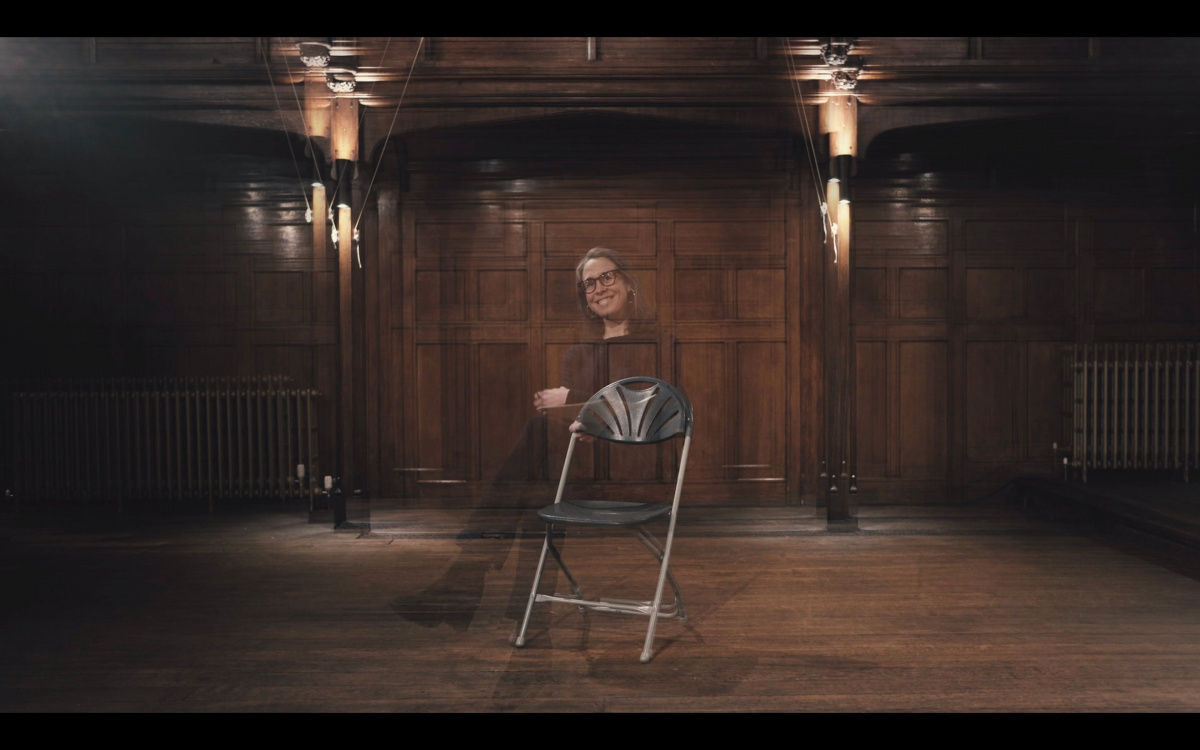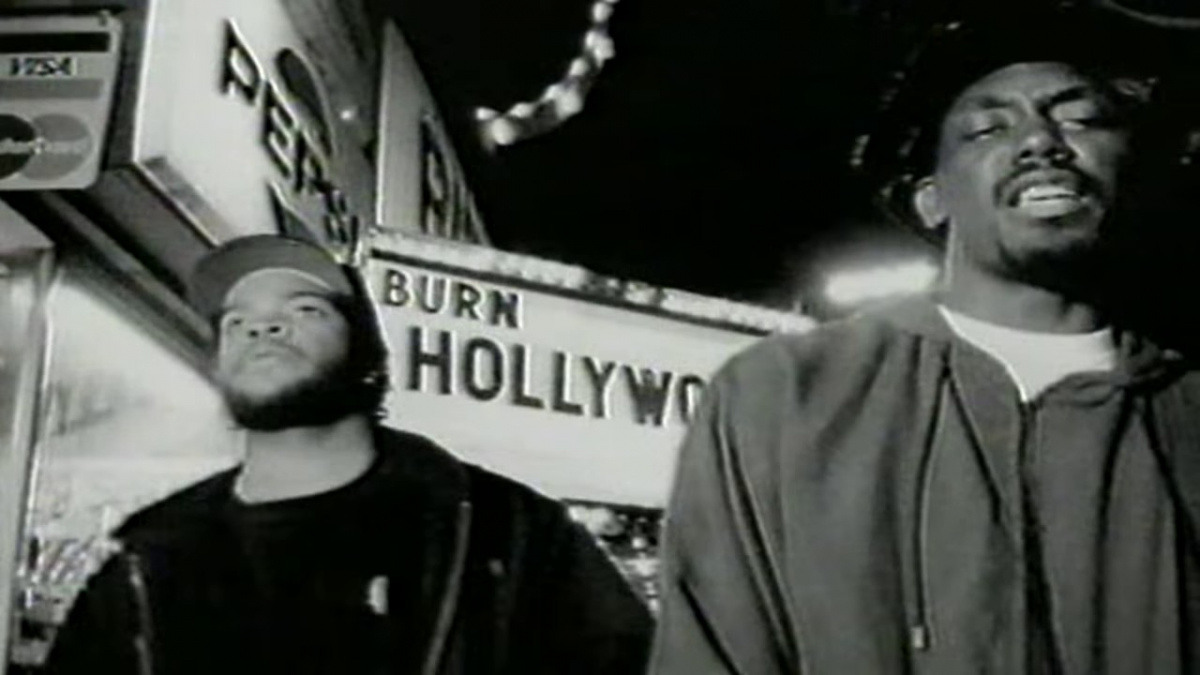In their track «Burn Hollywood Burn» (Def Jam 1990), Public Enemy criticized the representation of Black people in Hollywood movies. The mentality and circumstances cultivating these issues are the same ones that indirectly disavow the humanity of minorities in technology platforms and media thirty years later, our author argues.
A friend the other day said another friend of theirs had never actually heard a song from Public Enemy. This was a completely far-fetched possibility to me, especially with the individual being a Black man from the U.S. as well. Of course this could just be me showing my age, as Public Enemy was easily one of those groups that had a lot to do with my own personal development, upbringing, and world outlook. So many dope songs to choose from, but where should one start? After the initial shock wore off, I considered the different causes that PE gave voice to, or at the least made me realize I should pay attention to, thus increasing awareness and eventually letting me form my own opinions about them, regardless if I agreed or not. I decided that the best way to do this would be to find out what causes the person was sympathetic to, and find the PE song that referenced one of them.
A few of the obvious choices for me were «Black Steel in the Hour of Chaos», which spoke to the certain absurdity of being accused of draft-dodging as a Black man in the United States. Or «Shut Em’ Down», which referenced companies not paying their workers enough (thus extracting value from our communities) to reasonably afford the products they were producing. And «Burn Hollywood Burn», which referenced the further marginalizing of the Black image in the present Hollywood films and America’s history with doing so.
Can’t Wait to Listen to this Record
It’s with «Burn Hollywood Burn» that I have a bit more of a precise memory. After checking Discogs for the date (my memory is not that good) I realized that nine-year-old me begged my ma to let me go to Turtle’s Record Store to look at records after she went grocery shopping. She of course just wanted to go home afterwards, but somehow I won out and was able to get five minutes there. She didn’t know that I had five dollars on me and I went in to take a quick look. I always just loved being around records and music to be honest.
When I went in and saw that there was a new Public Enemy single, «Can’t Do Nuttin’ for Ya Man», I got excited! I wasn’t sure if that song was already on another album or if it was something completely new with a new album coming soon! With little time to spare and the feeling that I only had 40 more seconds before my mother started honking the horn to get me to hurry up, I purchased it, not sure what to expect. I wanted to hear it when I got back but lo and behold it was already past my bedtime and there was absolutely no chance to listen. I’d have to wait until the next day after school. (I would have tried in the morning, but since I had never heard it I didn’t as a precaution in case there was something in there that my parents would strongly object to and lead them to throw away my new treasure – see: ma throwing away my Yo! Bum Rush the Show due to the song title «Sophisicated Bitch»).
I spent the next day in school with baited ears and I couldn’t make it back soon enough to put on my new maxi-single. Luck would have it that that day I had the perfect combination of dad working overtime, my ma coming back from work a touch later, and my brother having tennis practice (or was it some other extracurricular activity?). Perfect! I could listen to it completely undisturbed! I listened to «Can’t Do Nuttin’ for Ya Man», cool! This song was kind of zany. I like zany. It might have not had that thing I was looking for from PE but it was amusing and it was mine before anyone else had it. Also, Flavor Flav said «kiss my butt» in the song which was a certified gem of a line to nine-year-old me. The novelty of the song wore off though and I meandered to the other side.
«Get the Fuck Outta Dodge» appealed to that part of me that felt like a rebel by having a song with the word «fuck» in the title, and the song «Burn Hollywood Burn» felt like something. Really like something. I bragged about my new treasure to my brother who of course talked shit about my music only to just as surely borrow (read: steal) my tape for him to listen to on his night out.
My brother came back the next morning and was talking about actually how good it was and to his credit actually explained the broader significance of «Burn Hollywood Burn», which was quite useful due to the fact that although I could sense the significance of it and I somewhat knew about the issues pertaining to what the movie Driving Miss Daisy were, I definitely didn’t know what or who Stepin Fetchit was or could be. This was how I became more acquainted with the history of minstrel shows. The conversations and thoughts developed through subsequent dialogues and observations regarding this song made me question the nature of systems in general. Why was it like that? What is the benefit of that and to whom? Who does this behavior harm? What is the solution?
I saw it (the problem that stood at the core of the song) as a byproduct of a system that wasn’t particularly set up for me personally. A reminder that these stories in film and television are written by those in power and are a reflection of their own hubris, position, and perception of the world. It reinforces their outlook on what makes them «special» or significant with no regards to «othered» human beings and how it makes them feel or seem. Well let’s be honest, this is a case of not finding those people worthy. A diminutive humanity. Ostracized from the pantheon of mortals through the process of being «othered». A case of the tools of a (culture) community and used by it which serve as a reflection of the people in that community that this tool is a product of. It’s something deeply encoded in this system.
Once encoded in that system it is basically designed into that system and the effects will of course be still present.
An Old Friend Who Is on Facebook
«J» is someone who has a habit I think of just doing shit and testing the waters, even some that could be considered questionable. (If it’s not, then it’s not really testing the waters now is it?). I still remember him doing a project called Mugu Guymen which was a noise project based on the email scam. He ended up using some imagery that could be or possibly wasn’t offensive, it was hard to say, but it definitely left a mark in my mind.
One day, years later, «J» ended up in Facebook jail. For a couple of weeks he had started to post images of nude Black women. It started off with very National Geographic like images, then more arty images, and I think some were even just certified porn images to be honest. A part of me was like «WTF?!» but another part was like, «that’s ‹J›…» and another part of me was like, «Wait what? Facebook didn’t take it down? Fascinating! Let me see how long this lasts!». It lasted. Then one day he posted an image of a topless white lady. That was the line of course. Facebook jail all day! Now when he was back on, he of course made the usual fuckzuck comments before commencing to prove it again by using the same method of comparison, only this time screenshotting the warnings and comments from Facebook. He stopped doing it, but an impression and a point had been made…
Lawrence ’n Dem White Guls
Sometimes I watch certain shit here (in Berlin) just because it’s got Black folks in it. I’ve found myself looking at all types of TV shows that I normally wouldn’t even consider, and some I wouldn’t even allow myself to watch. Every now and then though you find one that’s just an utter and complete gem. One that you quite honestly see yourself in and that resonates with you. After watching Atlanta this is the first time in my life that I could honestly say I could see myself in a set of characters. My first thought was, well I guess this is what white folks from L.A. or New York feel like often huh?
Another show that I found out about recently was Insecure. Issa Rae and her squad’s show. I love it! Honestly as of this writing I am waiting for Season 4 but feeling like a chump because if it just comes out once a week I am going to watch it, rather than waiting until the end and just bingeing it all. I guess the other part is having to wait extra howeverthefucklong it will be until the next season being that I am in Berlin and it becomes available muuuuch later.
Damn I love that show. Then also the soundtrack is so damn perfect! Lately, I have been finding a lot of sort of soul-ish based artists from L.A. like Ravyn Lenae, who I also heard on the show. There’s also cameos by Syd the Kid as well as songs featured. I have to say the one song placement that really hit me was when they played «Heartbreaks + Setbacks» by Thundercat. That was a perfect moment!
One day I’m about to watch another episode of Insecure on Sky TV and I am asked to put in my security code. It’s a precaution that’s put there because apparently this episode is extra saucy in some manner and they don’t want the kiddos to have access. I forgot about it as I watched the show as lil’ man is staying at his mom’s house that night so it doesn’t matter. One of the key male characters on the show, Issa’s ex-boyfriend, Lawrence meets two white girls in a supermarket. Long story short (not due to the quality of the content I assure you, just for the sake of me maintaining focus in this particular writing) they end up freakin’. All three of ‘em. Nothing strange here. It’s been in quite a few episodes of Insecure where this was happening. Many times where Issa or other friends of hers were getting it in. In case you didn’t know, Issa and all of her friends mentioned here are Black.
(Shout out! When Lawrence knew he had been used while his homeboy had been hyping him up as being the man for having a threesome and the reality of the internal dissonance it instilled).
So why exactly was I needing to put in my security code again?
/ stop trying to appeal to the morals (to the humanity) of someone who doesn’t see you as being human (read: worthy of those morals) /
(Were the white girls the only humans present there?)
In Our Image
The tools we use and the tools we create have our imprint embedded in them. When these companies and businesses that support a certain mentality create and present their media and content with restrictions based on some sort of moral initiative, then certain acknowledgements are filtered out. In this case: who is considered worthy of humanity?
No one’s humanity is negotiable.
(It is the unacknowledgement of humanity being presented in these tools and the ubiquitous «if they were white» question. Primary question being, would these traumatic videos be shareable if it was showing white people being killed?)
I still remember when Troy Davis was executed regardless of the outpouring of support and the possibility of his innocence. It was sent as a message to the public that it didn’t matter about him or what the public thought and that these things wouldn’t change.
Humanity at the Center of Moral Code: Sex and Violence
So is it so that the need for censorship is not to take for granted the human? To conceal those things seen as being sacred? The end of life and the creation of it? Sacred portals whose visions are to be protected from the uninitiated? To reveal these things to be seen as the betrayal of a human code?
Only for humans though. Nature shows it’s cool because they aren’t human. We can watch mating animals in the daytime as well as the end of life as it is merely a part of life right? And being that they are not human then we don’t break code per se right? Right?!!
Snuff Films
A snuff film or a snuffmovie, is «a movie in a purported genre of movies in which a person is actually murdered or commits suicide. It may or may not be made for financial gain, but is supposedly ‹circulated amongst a jaded few for the purpose of entertainment›» (Wikipedia).
A few years ago, there were pictures of Sandra Bland on the internet. I was avoiding looking at the pictures because, well, she was dead. Having to be subjected to death when you see yourself in it is not something one wants to always subject themselves to, and to be honest it’s not so healthy. One day I submitted to my curiosity thinking that perhaps what I wondered wasn’t exactly the case. I looked. I automatically had the feeling that I was looking at a dead woman. That feeling came over me. I was looking at a dead woman. There was no doubt in my mind…
According to Monica Williams, clinical psychologist and director of the Center for Mental Health Disparities at the University of Louisville, graphic videos (which she calls vicarious trauma) combined with lived experiences of racism, can create severe psychological problems reminiscent of post-traumatic stress syndrome (Williams 2015).
Since, I have dodged a number of these videos. Not looking at them for the sake of my own sanity, but also just as numb from the frustration and anger. And they keep coming, and coming. Hell, I don’t even expect them to stop coming. But I have to ask, would these snuff films be so easily shared if they weren’t of people of color?
Just as we now acknowledge that the deep racist undertones and overt racism of the films of early Hollywood and the days of minstrelsy were a reflection of that time and industry, maybe it’s time to consider how much has changed in the more current prevalent industry of the internet and how much «progress» has actually been made? Or is it a matter that not as much progress has been made as we think and that the target has moved? That barometer for what is considered progress has been rendered obsolete and our cultural output still reflects these prejudices.
I’m saying all of this to say that I hope that someone makes a «Burn Hollywood Burn» for the tech industry. Then we can tell our friends about it. Tell them what it means. What it might mean. What could be. And another older sibling can try and explain it to their younger brother.
This is why art is made. Why stories are told.
One of the reasons at least.
So yeah, I recommend «Burn Hollywood Burn».



